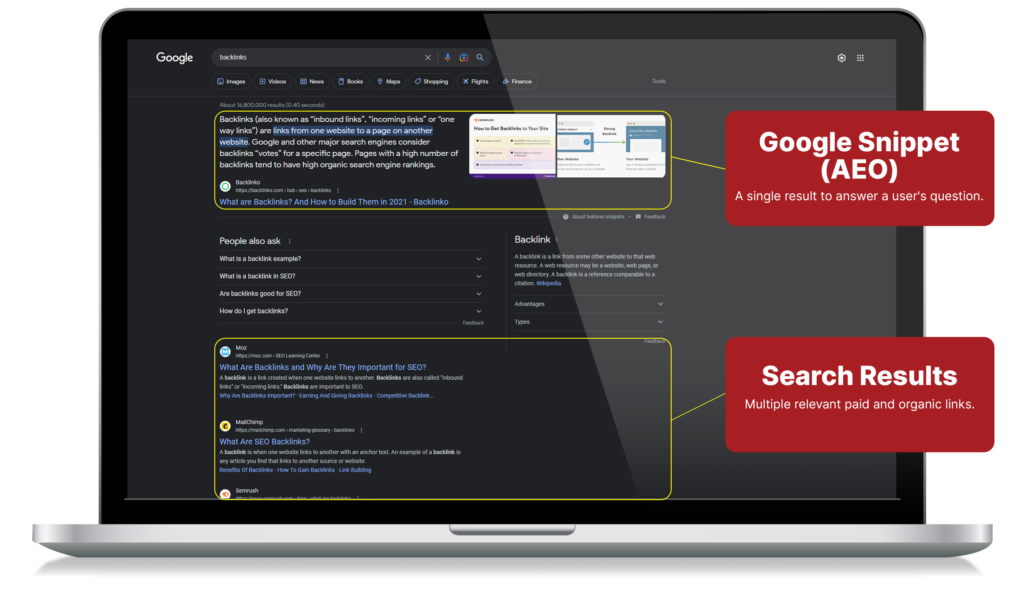AI and machine learning are growing rapidly, and they are affecting everything from search engine optimization (SEO) to content marketing. In this new age of machine intelligence, how AI will affect search engine optimization is quickly becoming one of the most common SEO questions we hear.
It’s true – AI is changing SEO. But will this change be for better or worse? That depends on how we, the users and teachers of AI, leverage this tool. Read on to learn more about the benefits of AI in SEO, and the potential pitfalls of this technology.
Will SEO be Affected by Growing Artificial Intelligence?
Like we mentioned before, Artificial Intelligence is already affecting SEO. Still, this impact might not be what you’re imagining. AI tools, instead of overtaking SEO, are simply changing the way SEO work is completed. As more AI tools like ChatGPT and Google Bard become available, SEO professionals must adapt to stay relevant.
Currently, SEO professionals across the world are experimenting with artificial intelligence as a brainstorming and SEO content creation tool. AI is still in its infancy, and AI-generated content is no substitute for SEO content created by humans. Instead of relying on AI to create content, we can use it to generate ideas and simplify complicated processes.
Will AI make SEO obsolete?
AI won’t rise up and take over civilization as we know it, and it will not replace SEO. In fact, it’s more likely that the two will work together to produce better SEO results!
AI and SEO are complementary; they each have their own strengths and weaknesses. For example, AI can quickly process large amounts of data to provide insights, but it can’t interpret data for you. Instead, AI gives you results based on what’s already been proven by humans. For sound data interpretations and guidance in SEO, you need a real-life human. Humans are great at interpreting results based on their own experiences with similar situations, we’re just not as fast at data processing. Sometimes we get writers-block, decision fatigue, or any other condition that makes us slower than AI.
AI cannot possibly make SEO, or the human processes within SEO, obsolete. Instead, it makes the SEO process and SEO professionals faster. A recent study from MIT confirms that using AI tools like ChatGPT boosts productivity by 40%, and quality by 20%. This means SEO companies can offer higher quality work that is produced more quickly.
While everyone enjoys the feeling associated with boosted productivity, we must avoid AI powered SEO. AI works by scanning the internet for information and delivering its finding to users. If SEO professionals overuse AI in SEO, we could inadvertently deny AI machines valuable, useful content, according to Entrepreneur and TikToker Edward Sturm in a recent video.
Will Google penalize AI content?
Google has a lot of work to do in the AI space, especially with its launch of Google Bard. But we can all breath a sign of relief, because Google will not penalize AI-generated content. If the content being created and posted is high-quality and relevant to users, there is no reason to fear using it in your SEO strategy.
AI content is still in its infancy and may not even be considered spam by search engine standards–but as long as there are websites out there trying to game the system and make money off of AdSense clicks Google has every right to protect itself from users who try too hard at manipulating its algorithms.
How AI Can Improve Your SEO
AI is a great tool for improving the quality of your website content. By analyzing user behavior and engagement, AI can give you insights into what your users want to see on your site–and ways to offer it. Ultimately, this will encourage users to stay on your page, engage more, and purchase!
We expect that, in the not-too-distant future, AI will become an integral piece of many applications. AI in 2023 can code websites and create custom art and graphics, but it’s most often used to answer questions. So, we’re expecting Microsoft to add ChatGPT answer engine features to its office suite, and for Google’s Bard to become an advanced assistant for mobile technology.
AI’s ability to quickly answer user queries has led to a notable trend in a subset of SEO – Answer Engine Optimization (AEO). Read on to learn more about AI and AEO.

Leveraging Answer Engine Optimization
Answer Engine Optimization (AEO) is a new way to optimize your content for search engines. It optimizes your content by making it more relevant to the user. This makes AEO an excellent tool for SEO looking for quick wins and long-term growth.
In essence, AEO leverages artificial intelligence (AI) technology to create content that’s optimized for Google Snippets. Google snippets, also known as featured snippets, are brief summaries or excerpts of information that appear at the top of Google’s search engine results pages (SERPs) in response to certain search queries. To create a snippet, Google’s algorithm looks for the most relevant and authoritative content related to the search query and then extracts a brief summary of that content to display as a snippet.
The idea behind the AEO approach is that users are more likely to click on links if they’re answering questions or providing information directly related to what they’re searching for in their browser window.
Explore the Future of Search Engine Optimization
With the rise of AI, we can expect to see some changes in how search engines work. However, it’s important not to panic and think that SEO is going away anytime soon. Instead, B2B SEO service providers like IQnection are using AI in SEO to your advantage. With these technologies available to us, marketers can anticipate market changes and generate marketing solutions that deliver real ROI at the lightning-fast speeds of 2023.











